Owning Up to Privilege and Moving Social Justice
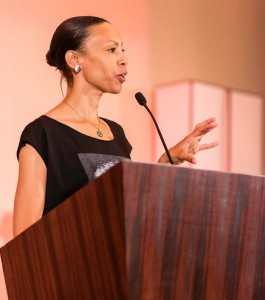 Sikivu Hutchinson, Black Skeptics Los Angeles, organizer of the Moving Social Justice conference. Photo courtesy of Sikivu Hutchinson.
Sikivu Hutchinson, Black Skeptics Los Angeles, organizer of the Moving Social Justice conference. Photo courtesy of Sikivu Hutchinson. “Here,” ordered the atheist/feminist author Sikivu Hutchinson, giving her impersonation of a member of the so-called New Atheism, “take this ‘We Are All Africans’ t-shirt and ticket to Darwin Day, and sit down and shut the fuck up while we white atheists front like we’re public enemy number one.”
As Hutchinson continued her opening remarks at the Moving Social Justice conference, organized by People of Color Beyond Faith and held October 11-12 in Los Angeles, California, I looked over at one of my fellow Sunday Assembly organizers. Like me, he’s a white, middle-class, straight male. “Wow!” we silently mouthed to each other; this was shaping up to be an eye-opening weekend.
From our first planning meeting in July 2013 to launch the Sunday Assembly-Los Angeles, we have tried to be very conscious of Sunday Assembly’s goal to be, as our charter says, “radically inclusive.” For our inaugural event we invited African-American comedian Steve Hill to do some of his stand-up routine and our keynote speaker was ex-Muslim blogger Heina Dadahboy (also a panelist at Moving Social Justice). We prided ourselves on attracting an audience that was at least half female and with a noticeable roster of Hispanic surnames. Still, we knew we could do better.
In June 2014 I read an article on the Washington Post website by Hutchinson titled, “Atheism Has a Big Race Problem that No One’s Talking About.” After pointing out that African Americans are only 13 percent of the population but make up 40 percent of the prison and homeless population, she went on to say,
Faith-based institutions provide resources to these poor and working-class families. They also fight racial discrimination, offer a foundation for community organizing and create access to social welfare, professional networks, and educational resources. These are essential issues, and atheists of color often find themselves allied in these missions.
When it comes to creating a viable alternative to the churches that dominate African-American communities, it was clear from her critique of predominantly white freethought organizations that “build it and they will come” was not going to cut it. I reached out to Hutchinson and made a date to sit and talk about what Sunday Assembly-LA could do to be more effective in reaching out to nonbelievers in marginalized communities. Something she said was one of those light-bulb moments for me: “Don’t expect us to come to your events before you’ve come to support ours.” That’s when I learned about the Moving Social Justice conference that would host speakers including Dr. Anthony Pinn of Rice University, Raina Rhoades of the Chocolate City Skeptics, author and engineer Donald Wright (Houston Black Non-Believers), Debbie Goddard of African Americans for Humanism, and blogger AJ Johnson, who is also a board member of Sunday Assembly-New York.
As an atheist-humanist-skeptic-rationalist, I had long prided myself (like many freethinkers do) on looking at the world through the lens of reason, employing critical thinking to focus. Evidence makes it plainly obvious that all humans are equal—male or female (or somewhere in between), straight or gay, black, white, or brown—and if we just bring a scientific perspective to bear, we can solve the problems of poverty, racism, sexism, and, ultimately, mental slavery to millennia-old mythologies. As an “enlightened nonbeliever,” how could I possibly be responsible for any of the inequities or injustices of the world?
Over the course of the weekend a few Sunday Assemblers sat humbly to listen and learn about how black voters got scapegoated for the passage of Prop. 8 in California; why many black and Latino gays are frustrated by the millions of dollars spent on supporting marriage equality at the expense of funding services for homeless LGBT teens; how the Los Angeles County Board of Supervisors has voted to spend $2 billion to incarcerate rather than treat the mentally ill (who are disproportionately people of color); and how black students (including preschoolers!) are suspended from school at rates many times higher than their white and Asian classmates.
While the nation reeled in horror and frustration in August at the murder of yet another young black man, this time in Ferguson, Missouri, his community was saying, “Welcome to our world where this happens everyday.” The death of Michael Brown was a grisly reminder of just why the goals of the Moving Social Justice conference need to be part of the humanist conversation. Anthony Pinn wrote about the Ferguson tragedy, “It’s time for humanists to dig deeper. It’s time for humanists to stop being so lazy regarding issues of race violence. Race and the consequences of our racist society must become a priority within the humanist movement.”
Many people might agree these are serious issues but wonder, “What does this have to do with my not believing in God?” A number of online authors have certainly said so, like Michael Luciano of the Daily Banter who proclaimed: “Atheists Don’t Owe Your Social Justice Agenda a Damn Thing.” But what these atheists (who are, of course, almost exclusively people of privilege) fail to grasp is that these are real world problems that affect real world people. Fighting against imaginary gods is good, clean fun sometimes, but at the end of the day (or of our one precious life) what really matters is what we have done to make the world a better place. That’s what separates atheism from humanism, an important distinction that falls outside Luciano’s narrow view.
Chatting during the breaks with speakers and other attendees, we learned that when mainstream humanist/atheist organizations talk about improving diversity, to nonbelievers of color that sounds like all we’re trying to do is make our organizations a few shades darker without fundamentally changing them. Only when we truly engage in social justice instead of just inviting the occasional minority speaker, when we own up to our own privilege, when we make the effort to educate ourselves about issues that affect marginalized people, will we begin to live up to the ideals that we espouse.
Or as Raina Rhodes poignantly put it, “If your humanist group isn’t doing anti-racism work, it’s not a humanist group.”
The next Moving Social Justice conference will be held in 2015 in Houston, Texas.
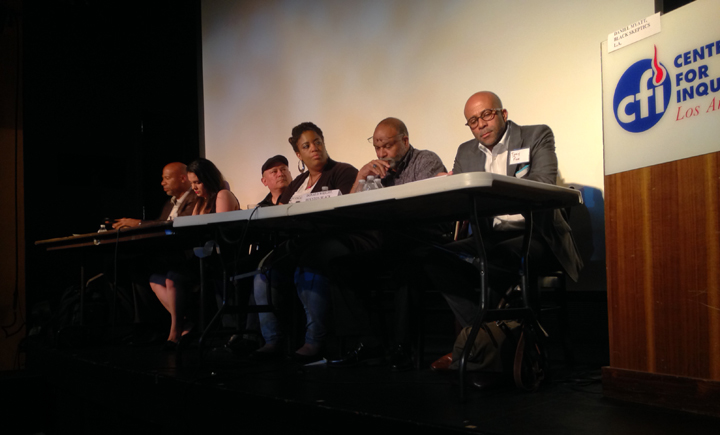
One of the panels included speakers Raina Rhodes (3rd from right), Donald Wright (2nd from right) and Dr. Anthony Pinn (right). Photo by Noah Wiles.
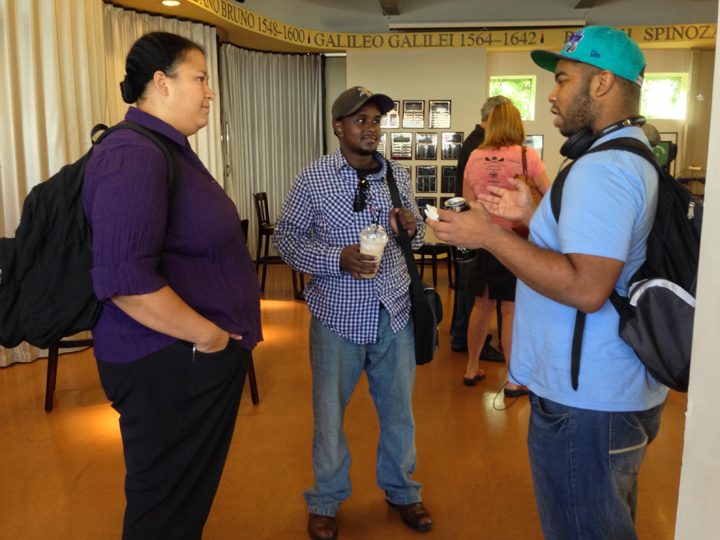
Debbie Goddard, African American for Humanism, chats with hip hop artist MC Brooks during a break. Photo by Noah Wiles.
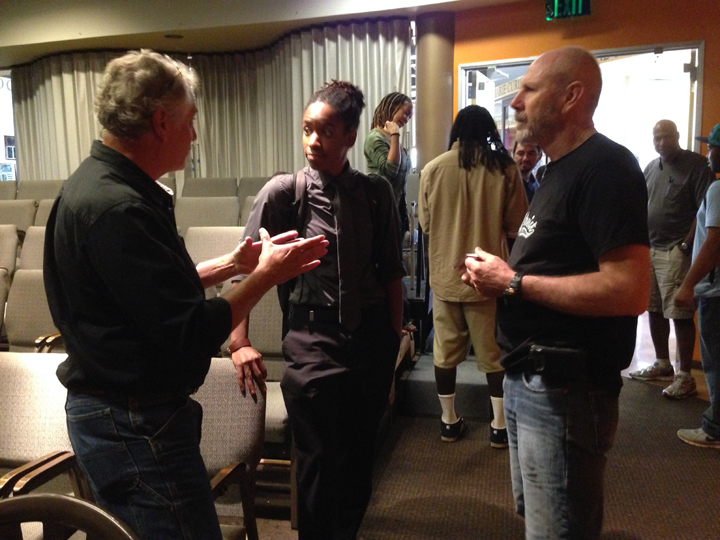
Sunday Assembly-Los Angeles co-director Ian Dodd (left) talks with SA-NYC board member AJ Johnson (center) about the role of humanist organizations in social justice issues. Photo by Noah Wiles.
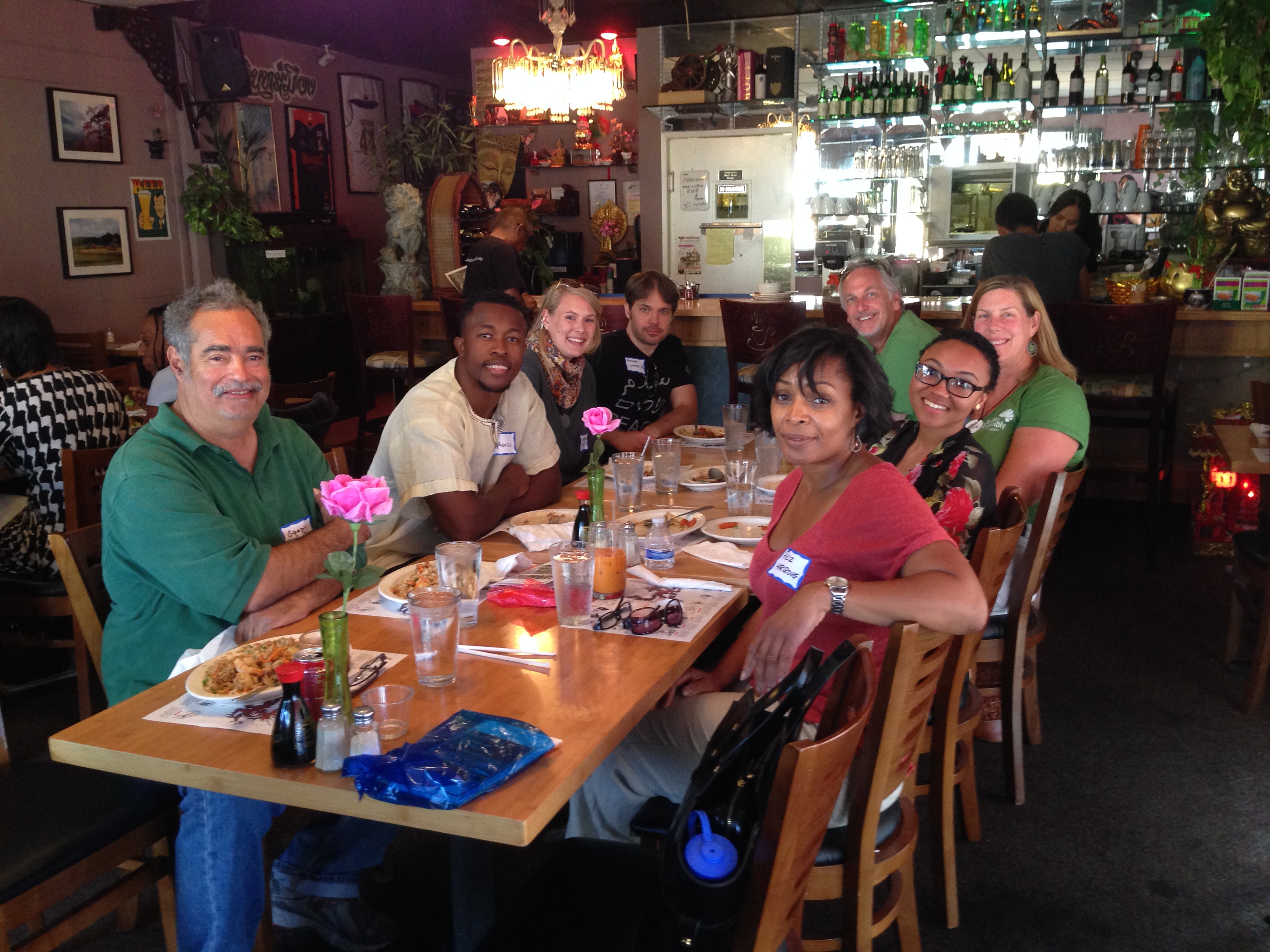
The Sunday Assembly-LA organizers enjoy lunch with other attendees at a nearby restaurant on Oct. 11. Photo by Noah Wiles.
